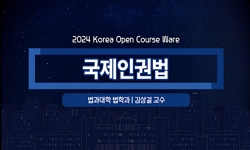In Korea, human rights interest litigation has been regarded as one of the effective way to change the world, i.e. to cause social change. In fact, we have seen so many legal achievement through the victory of litigation. However, it is need to carefu...
http://chineseinput.net/에서 pinyin(병음)방식으로 중국어를 변환할 수 있습니다.
변환된 중국어를 복사하여 사용하시면 됩니다.
- 中文 을 입력하시려면 zhongwen을 입력하시고 space를누르시면됩니다.
- 北京 을 입력하시려면 beijing을 입력하시고 space를 누르시면 됩니다.
인권보호에 있어서 사법부의 역할과 공익인권소송
한글로보기https://www.riss.kr/link?id=G3794562
- 저자
-
발행기관
-
-
발행연도
2014년
-
작성언어
Korean
-
주제어
인권 ; human rights ; judicial review ; leglaism ; judiciary ; courts ; judicial activism ; public interest law ; litigation ; 사법심사 ; 법률주의 ; 사법부 ; 법원 ; 사법적극주의 ; 공익인권법 ; 공익소송 ; 공익변호사 ; 공익활동
-
자료형태
한국연구재단(NRF)
-
0
상세조회 -
0
다운로드
부가정보
다국어 초록 (Multilingual Abstract)
In Korea, human rights interest litigation has been regarded as one of the effective way to change the world, i.e. to cause social change. In fact, we have seen so many legal achievement through the victory of litigation. However, it is need to carefully consider if this new movement is effective in practice and desirable in civil society. On the one hand, litigation is very effective because of the enforcement of the court’s decision. Although the case is decided against the plaintiff (i.e. public interest lawyers), the litigation itself could be a useful way to spread what they want to the public and to form a social consensus. In addition, in comparison with other ways for social change such as legislation movement, the litigation is easy for the minority to access. In most cases, relatively less resources are needed for litigation On the other hand, however, when the insistences of social movements are translated into legal language in the court, they can be distorted or the court tend to fail to absorb all aspects of them. Also, the judiciary is only limited to adjudicating the case disputed, and cannot cause fundamental social change relating the case. If the court can play a positive role in social change, it is sceptical that the judiciary, a non-majoritarian institutio
국문 초록 (Abstract)
한국사회에도 공익인권소송이 세상을 바꾸는 하나의 운동방식으로 자리잡았다. 실제로 ‘승소’하여 실제로 세상을 변화시키는 성과로 이어진 경우도 적지 않았다. 하지만 이러한 소송운...
한국사회에도 공익인권소송이 세상을 바꾸는 하나의 운동방식으로 자리잡았다. 실제로 ‘승소’하여 실제로 세상을 변화시키는 성과로 이어진 경우도 적지 않았다. 하지만 이러한 소송운동이 효과적이고 바람직한 운동인지에 대해서는 검토가 필요하다. 일단 긍정적인 측면을 본다면, 판결의 강제적 효력 때문에 소송에서의 승소는 가장 효과적인 방법이라고 할 수 있다. 그리고 설사 소송에서는 패소한다고 하더라도 주장의 가치를 사회적으로 확산시키고 국민 공감대를 넓히는데 효과적인 경우도 있다. 또한 소송운동은 입법운동이나 다른 사회운동의 방법에 비해, 소수자나 사회적 영향력이 적은 집단도 쉽게 활용할 수 있는 수단이기도 하다. 하지만 사회운동의 주장이 소송을 통해 전환될 때, 법원에 의해 왜곡되거나 법원이 이를 충분히 수용하지 못하는 경우가 있다는 것은 문제다. 또한 사법부는 당해 사건을 판단할 뿐이기 때문에, 궁극적인 사회변화를 이끌어낼 것을 기대하기는 어렵다. 설사 사법부가 그런 역할까지 해준다고 해도, 민주적으로 선출된 기관이 아닌 사법부가 사회변화를 주도하는 것이 바람직한지는 의문시된다. 공익인권소송은 시민들의 주장을 공식적으로 관철시키기 위해 좋은 수단임은 분명하며 실제 성과도 있었다. 하지만, 그 과정에서 잃을 수 있는 것이 무엇인지 면밀한 판단이 필요하며, 특히 민주화 이후 시민들이 참여할 수 있는 다양한 공간이 열려 있는 상황에서 굳이 사법부를 경유하는 공익인권소송이 인권보호에 유용한지의 여부에 대해서는 개별사안에 따라 면밀한 검토가 필요할 것이다.











